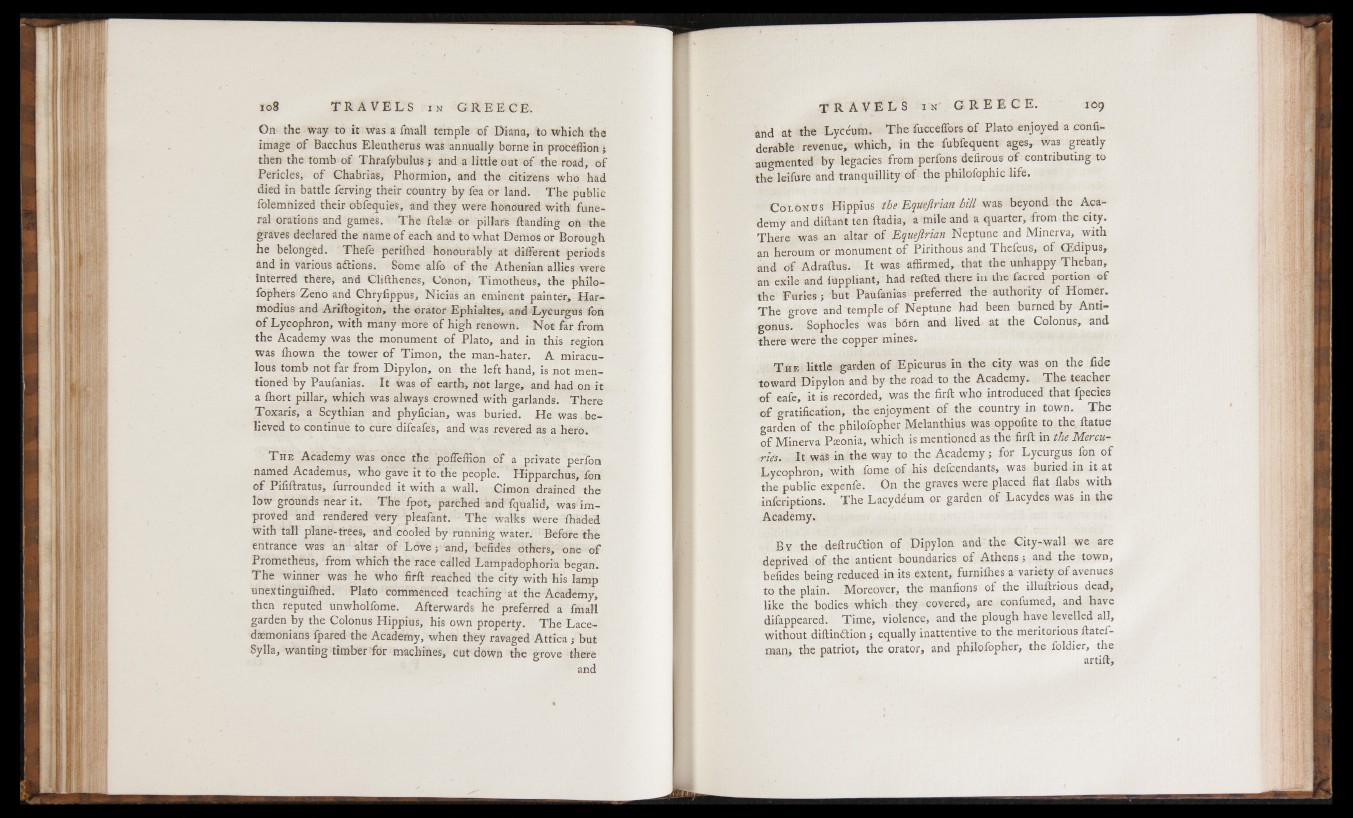
On the Way to it was a final! tempte o f Diana, %o which the
image erf Bacchus E leather us was iannuaily borne in. pro'ceffion i
then the tomb of Thfafybulus > âhd a little out of the road, of
Pericles* o f Chabrias, Phurmiob, and the eitàzéns who had
died in battle ferving their country by fea or land. The publie
folemnized their obfequies, and they were honoured With funeral
orations and games. The ftebe or pilla« ftanding on the
gt&ves declared the name of each and to What Demos or Borough
he belonged* Théfe peiiffiéd hoUPurably at different periods
and in various actions. Seme alfo o f the Athenian allies were
interred there, and Clifthenes, Gönon, Timotheus, the pbilo^
fophers Zéno and Ghry lippus, NiéiUs âii éminent painter, ffar*
modius and Anftogiton, the ©ratöf Ephiabes, and-LyéurgHS fon
o f Lyeophron, with mdhy èiöre o f high renown. Not far from
the Academy was the monument of Plato, and in this regio»,
was Ihown the tower o f Timon, the man-hater. A miraculous
tomb not far from Dipylon, on the left hand, is not mentioned
by Paufanias. It Was of earth, nét large, and had on it
a Abort pillar, which was always crowned with garlands. There
Toxaris, a Scythian and phyfician, was buried. He was .he-
lieved to continue to cüre difeafes, and was révçred Us a hero. *
T h e Academy was once the ppffeiKon of a prWate "peSbh
named Academus, who ga^fc rtifb the propjfeT ‘ Thpparchus, fon
of Piiiftfatus, furrounded it with a wall. Cimonf drained' the
low gróttrids iièar it. Thé fpót, patched and fqdaîid, waslm-
proved and rendered very pfcafluw. - The Walts Were flifedéd
With tall plané-trées, andóóolëd by rtmnirtg Water. 1 Before the
entrance Was àh^hkaf d f L ó^ rand,'l^fidés others, ohé of
Prometheus, from which the race called Latnpaiföphoria began.
The winner was he Who firft leached the city with his lamp
unejftifrguiftred. Plato Commenced teaching Lat the Academy,
then reputed Unwholfome. Afterwards he preferred a fifaaM
garden by the Colonus Hippius, his own property. The Lacedaemonians
fparéd thé Academy, when they ravaged Attica ; but
Sÿlla, wanting timber 'for machines, eat down the grove there
and
109
and at the L^<Mm The fiicceffw* o f Plato enjoyed a confix
deraMe revenue, which, in the tfubfequent ages, Was greatly
augmented by legacies from perfons defirous erf contributing to
the leifure and tranquillity of the philofophic life.
CdtONes ^ p p iu e S e Eqmft^ianijiU was • fceyondxitfee A ca demy
and diftant ten ftadia» a mile and a quarter, from the city.
There, was an altar of Eqtiejlrian Neptune and Minerva, with
an heroum bVmonument of Pirithous and Thefeus, of CEdipus,
and crf Adfaftus.HIt was affirmed, that the unhappy Theban,
an exile and fuppliant, had refted there in the focred portion o f
th e ’ Fwrfefrj 'but Paufanias preferred the authority of Homer.
T h e gibve and temple Of Neptune had been burned by Anti-
gonus. Sophocles was b6rn and lived, at the Colonus, and
there Were the copper mines.
T he Httle garden of Epicurus in the city was pn the fide
toward Dipylon and by the road to the Academy. T h e teacher
o f cafe, it is recorded, was the firft who introduced' that fpecies
o f gratification, the enjoyment of the country in town. The
garden of the philofopher Melanthius was oppofite to the, ftatpe
of Minerva Pffionia, which is mentioned as the firft in the Menu-
J jg | g l t was in the way to the Academy j for Lycurgus fop o f
LycophjSnTtWifh fome pf,his defendants,, was buriedin it at
the public expeufe. On the graves were placed flat .flabs with
inscriptions. The Lacydeum or garden of Lacvdes was in the
Academy«. |
B y the deftrudion of Dipyloa and’ the City-wall we are
deprived of the antient boundaries» of Athens j and the town,
befides being reduced in its extent, furniflres a variety o f avenues
to the plain. : Moreover, the manfions of the illuftrious dead,
like the bodies-which they covered, are eonfumed, and have
difappeared. Time, violence, and the plough have levelled all,
without diftindtion i equally inattentive to the meritorious ftatef-
man> the patriot, the orator, and philofopher, the foldier, the
artift,